
We kindly inform you that, as long as the subject affiliation of our 300.000+ articles is in progress, you might get unsufficient or no results on your third level or second level search. In this case, please broaden your search criteria.

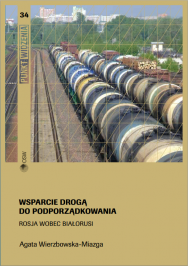
Niezależnie od konfliktów i zadrażnień we wzajemnych relacjach Rosja od lat regularnie inwestuje w Białoruś. Jej wsparcie stało się istotnym czynnikiem pozwalającym na funkcjonowanie białoruskiego modelu gospodarczego, a tym samym utrzymanie stabilności sytemu politycznego. Ciągła gotowość Rosji do pomocy wynika ze znaczenia, jakie ma dla niej Białoruś. Białoruś wpisuje się w ważne bieżące cele polityki rosyjskiej – zwłaszcza w projekt tworzenia Unii Celnej. Jego realizacja jest w tej chwili dla Rosji kluczowa, przede wszystkim za względu na Ukrainę. Z tego względu, od 2011 roku obserwować możemy wzrost rosyjskich nakładów na pomoc dla Białorusi. W 2012 roku zostały one jeszcze dodatkowo zwiększone, obejmując poza wsparciem ekonomicznym także polityczne. // Rosyjskie wsparcie ma jednak swoją cenę. Celem Moskwy wobec Mińska jest ustanowienie kontroli nad białoruską gospodarką, dającej wpływ także na pozostałe dziedziny funkcjonowania państwa. Coraz bardziej uzależniony od rosyjskiej pomocy Aleksandr Łukaszenka będzie ostatecznie zmuszony do stopniowego spełniania rosyjskich żądań.
More...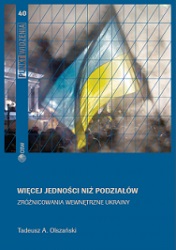
Ukraina jest krajem głęboko podzielonym wewnętrznie, jednak zmiany, które zaszły od powstania niepodległego państwa, sprawiają, że podziały te w coraz mniejszym stopniu mają charakter terytorialny, a podział na historyczne „sub-Ukrainy” zaciera się, zwłaszcza w świadomości młodego pokolenia. Na Ukrainie nie ma dwu konkurencyjnych tożsamości regionalnych, zachodniej i wschodniej. Obok zachodniej, której kluczową wartością jest jedność kraju istnieją jedynie lokalne, zróżnicowane patriotyzmy poszczególnych regionów wschodu i południa kraju. Obecny ruch protestu umacnia poczucie jedności kraju. Także jego przeciwnicy opowiadają się za niepodzielnością kraju, żądają natomiast daleko idącej decentralizacji kraju, co często jest błędnie uznawane za separatyzm. Tendencje separatystyczne są pobudzane z Rosji, jednak z niewielkim powodzeniem. Wyjątkiem jest Krym, pod większością względów pozostający poza dynamiką procesów społecznych Ukrainy – tu tendencje separatystyczne są rzeczywiście zakorzenione.
More...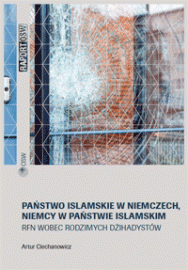
In Germany, Islamic radicalism is not a new and unknown phenomenon and departures of jihadists to conflict regions have been recorded before. However, the present scale of this phenomenon, alongside threats formulated towards Germany, has made Germans aware of the size of the risk. The Federal Office for the Protection of the Constitution (BfV) considers several hundred individuals who in recent years travelled to fight in the war alongside groups from which they originate to be one of the greatest threats to Germany’s internal security. Despite the fact that they have not organised any attack on a scale comparable to that of the attacks carried out in Madrid, London, Paris and Brussels, through their presence and activity, Islamic radicals permanently residing in Germany exert a certain influence on how the German state and society function. Moreover, their existence is a symptom of a deep problem which is unlikely to be automatically resolved if and when Islamic State collapses, the possibility to travel to the conflict regions is blocked, and the jihadists returning from these trips are taken to court. The problem of the radicalisation of Muslims living in Germany will likely grow in the coming years. The biggest fear experienced by security services and politicians involves this radicalisation translating into acts of violence and terror carried out in Germany, the potential reaction to these by German radicals, and the social and political consequences of such conflicts. Despite not being interconnected, recent attacks involving migrants (the summer of 2016) have made the slogans promoted by anti-immigrant and anti-Muslim groups all the more credible. Topics referred to in these slogans include: the impossibility of integrating Muslims, crime among immigrants, and the state’s failure to fulfil its commitments towards its citizens.
More...
Przystąpienie Szwecji i Finlandii do NATO długofalowo podniosłoby poziom bezpieczeństwa w regionie Morza Bałtyckiego, zmieniając polityczno-wojskową nierównowagę korzystną obecnie dla Moskwy. Jest jednak mało prawdopodobne, aby w najbliższych latach szwedzka i fińska polityka bezaliansowości uległa rewizji. Obecnie NATO prowadzi z oboma państwami najbardziej zaawansowaną współpracę wśród wszystkich państw partnerskich. Znaczenie tej współpracy dla Szwecji i Finlandii rośnie wraz z coraz większą niepewnością w regionie. Dalsze jej zacieśnianie będzie jednak ograniczane brakiem członkostwa obu państw w Sojuszu. Mimo pozytywnego wpływu na bezpieczeństwo regionu współpraca ma też negatywne implikacje. Nie eliminuje niepewności co do zakresu współpracy obu krajów z Sojuszem w przypadku konfliktu militarnego. Sztokholmowi daje złudne poczucie bezpieczeństwa, hamując wzrost wydatków na obronność. A w Helsinkach jest traktowana jako element polityki odstraszania wobec Rosji, a nie realnie rozważana alternatywa.
More...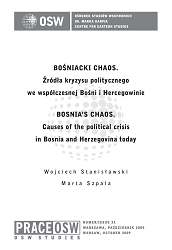
A new form of 'transformational crisis' has been observed in Bosnia and Herzegovina since at least 2005. Politicians representing the three major ethno-political communities (Bosnians, Croats and Serbs) have successively been raising disputes and have employed various political tools to preserve the conflicts instead of resolving them. As a result, the central state institutions and organisations have been weakened and attempts to replace them with narrower ethnic structures have been made. This is increasingly paralysing the state, thus impeding its everyday operation and preventing its structures and legislation from being modernised; had this been achieved, it would have resulted in a real acceleration of the process of Bosnia's integration with the EU and NATO. The present crisis is also an effect of the disagreement between the key international players - the European Union, the United States and Russia - over the 'plan for Bosnia' and the role and duties of the Office of the High Representative, who acts on behalf of the international community in the country.
More...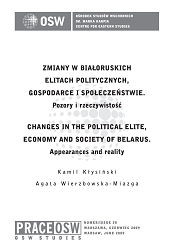
In late 2006 and early 2007, relations between Russia and Belarus were hit by the most serious crisis in many years. In a setting of heightened tension, the Belarusian authorities decided to gradually modify their economic policy and thoroughly restructure the ruling class. The new situation created new, much more difficult challenges for the Belarusian opposition. // The processes initiated by the authorities were not intended to bring about either the democratisation of public and political life or full economic liberalisation; their only purpose was to enable the regime to tackle new challenges and survive in the changing international context. Nevertheless, modernisation has been initiated in Belarus' authoritarian system of power, which until now was considered to be completely incapable of reform. This puts the country's main political and economic partners, including the European Union, in a new situation.
More...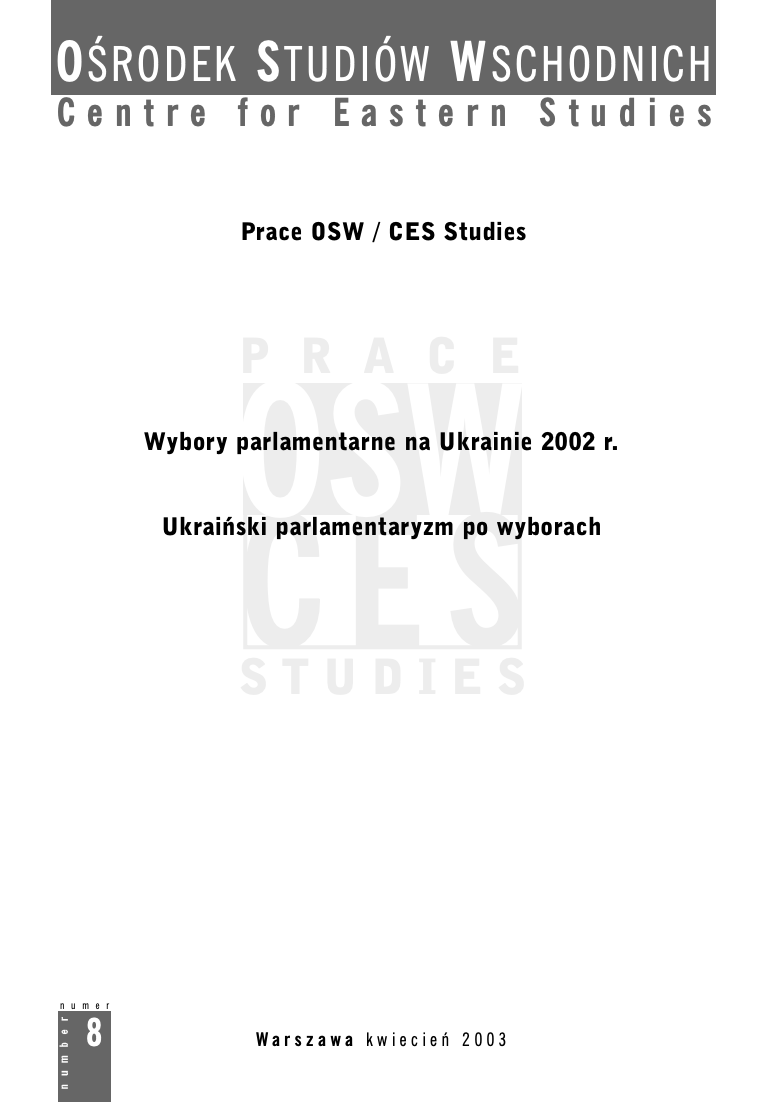
The dominant force in Ukraine's Verkhovna Rada, elected in March 2002, are the deputies of "One Ukraine", a fraction of the pro-presidential centre. "One Ukraine" has refused to admit any of the opposition's representatives (either from the right or left wings) into the parliament's presidium, but has accepted opposition-appointed heads of many parliamentary commissions. Viktor Yuschenko's "Our Ukraine", which has been the largest parliamentary fraction since June, attempted to proclaim itself the centre of the parliamentary majority, but its policy was awkward and inconsistent, and the main success of this club was that it didn't break up. Viktor Yuschenko's moves have been particularly incoherent and they undermined the image of Yuschenko as Ukraine's future leader, created throughout the course of the electoral campaign.In autumn, the main oligarchic groups and their representative fractions ("One Ukraine", which proved to be a useless instrument, was dissolved in June), reached a compromise with the president. It was agreed that the new prime minister should be a Donetsk clan representative (Viktor Yanukovych), and that the Dnipropetrovsk clan should appoint the president of the National Bank of Ukraine (this position went to Serhij Tihipko). The Kyiv clan obtained the President's Administration (Viktor Medvedchuk was appointed in spring) and a considerable number of parliamentary commissions. The president's interests in the government are to be protected by Mykola Azarov, former Head of the State Tax Administration. This compromise "package" was designed to secure the shares of the main oligarchic clans in the power and the president's strong position as mediator.
More...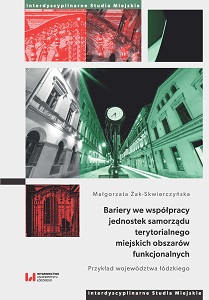
Representatives of science and practicians have for years been looking for ways to shape durable competitive advantages of the country's economy. Their goal has been to find out what actions taken under development policy lead to increasing the competitiveness of individual territories.The territorial and integrated approach to development is increasingly breaking through, which in practice has been reduced to functional areas, including urban functional areas, consisting of the central city and its surroundings, which is the area for the interactive spread of phenomena and processes occurring in the centre.Unfortunately, blockades within urban functional areas have a negative impact on building competitive advantages based on modern factors which rely on human and territorial capital.The publication discusses the cooperation of local government units in Łódź Voivodeship with various partners within urban functional areas, with particular regard to barriers which translate into joint actions for the development of cities and their surroundings.The assessment of the phenomena occurring in this area has made it possible to formulate recommendations for further intervention aimed at improving the cooperation.The results of the research undertaken show particular utility for social and economic development of various territories and can be a starting point for the formulation and implementation of solutions to build relationships between various entities participating in the development processes.
More...
The authors describe the history of Africa, starting from prehistoric times, throughout the period of early and late European penetrations, to contemporary political problems. They also present issues concerning the history of travel, discoveries, conquest and colonisation. The volume contains a text devoted to the methodology of African Studies. Several articles are based on ethnographic field research and concern contemporary phenomena in Africa.
More...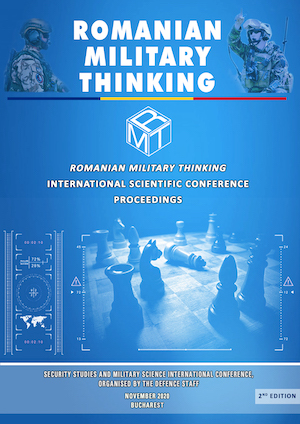
The second edition of the Romanian Military Thinking Conference, entitled “Military Strategy Coordinates under the Circumstances of a Synergistic Approach to Resilience in the Security Field”, proposes a topical issue: defence, approached synergistically and intelligently, increases efficiency in our noble mission, that of serving national interests. It is important for the actors involved to reach a common understanding of the concept of resilience, addressed in a double key, as it is specified in the National Defence Strategy for the period 2020-2024. From an organisational point of view, the conference had an academic component, focused on the presentation and publication of scientific articles, and a debate-based component, focused on a practical perspective. Both components of the conference were covered by three sections: Intelligence and Security, Military Theory and Art, Defence Resources Management.
More...
It was Robert Dahl, more than fifty years ago, who noted the importance of parliamentary opposition and established a framework for studying it. Since the publication of his ground -breaking Political Opposition in Western Democracies in 1966, many scholars, drawing on his work, have pointed out the importance of the opposition for parliamentary democracies. One contemporary author is Helms (2004), who emphasises that limiting the power of the government is a crucial step during the emergence of new democracies. The opposition is the only actor that can exercise influence on the government directly in the parliament where it works. This is why, for instance, Christiansen and Daamgaard (2008) note that opposition parties are the essence of parliamentary democracy. As far as empirical studies are concerned: contemporary political scientists do focus extensively on opposition forces, but they tend to examine non -parliamentary forms of opposition more often. However, there is no gainsaying that some authors have analysed parliaments and their relationships with governments. The research lens is often held to the overall development of parliamentarianism in individual countries, or comparatively across several (see e.g. Ilonszki, 2008; Kopecký, 2005); or authors analyse legislature -executive relations largely on the basis of King’s classic typology of these relations (e.g. Millard, 2008; Pettai and Madise 2006, Kopecký and Spirová, 2008).
More...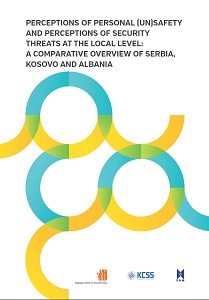
This paper presents comparatively citizens’ views of their personal safety and security at the local level, as surveyed in Albania, Kosovo and Serbia in October 2013, as part of the joint initiative ‘Security Research Forum Belgrade-Prishtina-Tirana’, run by the Belgrade Centre for Security Policy (BCSP), the Kosovar Centre for Security Studies (KCSS) and the Institute for Democracy and Mediation (IDM) from Tirana. The survey was conducted using the same questionnaire in all three communities, taking a representative sample of citizens. In Serbia, 1200 citizens were interviewed, including a sub-sample of 200 citizens in Southern Serbia (the municipalities of Preševo, Bujanovac and Medvedja). The survey in Kosovo encompassed 1119 respondents, including 100 ethnic Serbs residing in North Kosovo. In Albania, 1100 citizens were interviewed. The analysis is complemented by data from 2014 and 2015 in order to show the trends in citizens’ perceptions of personal safety and local security.
More...
The publication takes a cross-sectional look at the consequences of Polish membership in the European Common Market (ECM). It explores the benefits gained from Poland’s membership in the European Union and estimates the economic results of participating in the ECM: the transfers (structural funds and funds linked to the common agricultural policy), the balance of benefits and costs for Poland resulting from the four single market freedoms: free movement of goods, capital, persons and freedom to establish and provide services. The volume contains reflections on the importance of European funds for the development of Poland, as well as the balance of costs and benefits of the membership for the Polish agri-food sector.
More...
Carefully selected and first translated into Polish excerpts from academic works, which shaped the international relations science. The anthology reflects the plurality of theoretical, normative and methodological approaches, characteristic of modern international relations science.
More...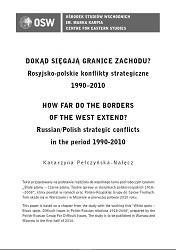
This paper is based on a chapter from the study with the working title ‘White spots – Black spots. Difficult issues in Polish-Russian relations 1918-2008’, prepared by the Polish-Russian Group for Difficult Issues. The study is to be published in Warsaw and Moscow in the first half of 2010.
More...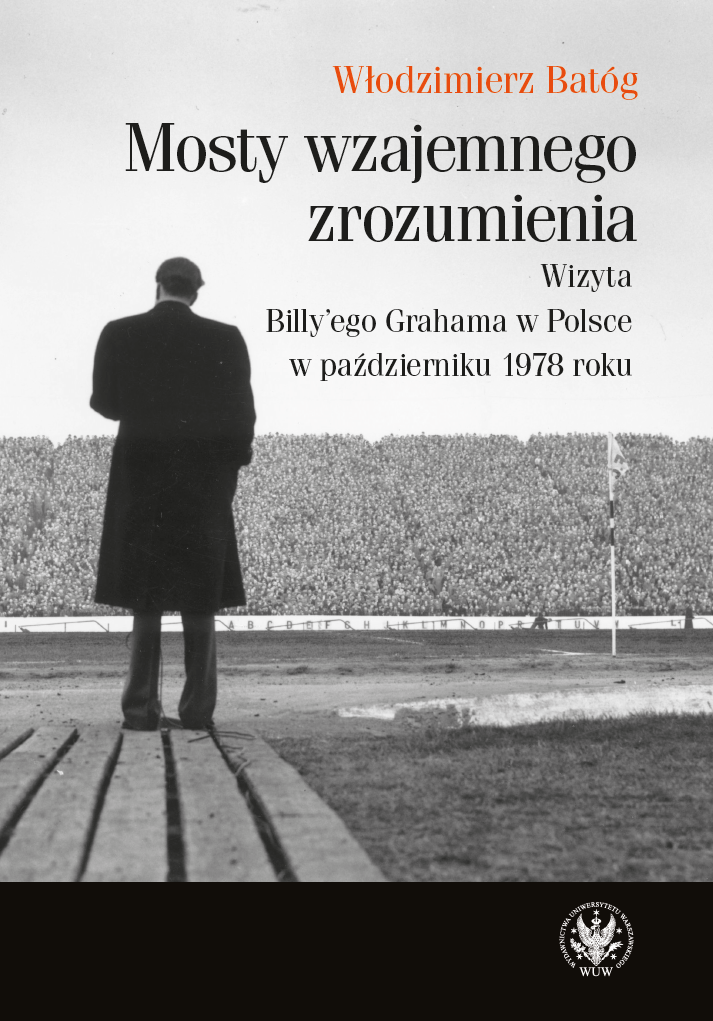
Billy Graham, Polish People’s Republic, preacher, USA-USSR relations, religious relations, evangelism, Protestants, BaptistsThe publication discusses the visit of the American preacher Billy Graham to Poland in 1978, presenting its circumstances, course and results. It analyses the causes of the invitation issued by the Polish Baptist Church as well as the attitudes towards it adopted by other Protestant churches, Catholic Church and the authorities of the Polish People’s Republic. It also shows religious relations in Poland and in the world in the 1970s and American presence in communist countries made possible through unconventional methods.
More...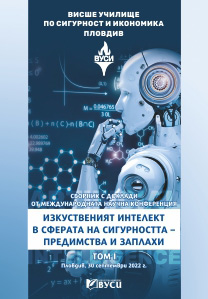
The present collection of the Higher School of Security and Economics (Volumes I and II) captures the highly fruitful international scientific conference on Artificial Intelligence in Security - Advantages and Threats, which took place in September 2022. The edition contains keynote and plenary papers. They are divided into three scientific panels focusing on topics such as "Artificial Intelligence Systems in Security", "Economic Growth and Sustainable Development" and "Artificial Intelligence in Administration, Public Management and Social Sciences". Speakers include academic authorities from Europe, Asia and Africa. The proceedings of the VUSI conference are published in two volumes by VUSI Publishing. There is also an online abridged version of the publication available on the VUSI website – www.vusi.bg.
More...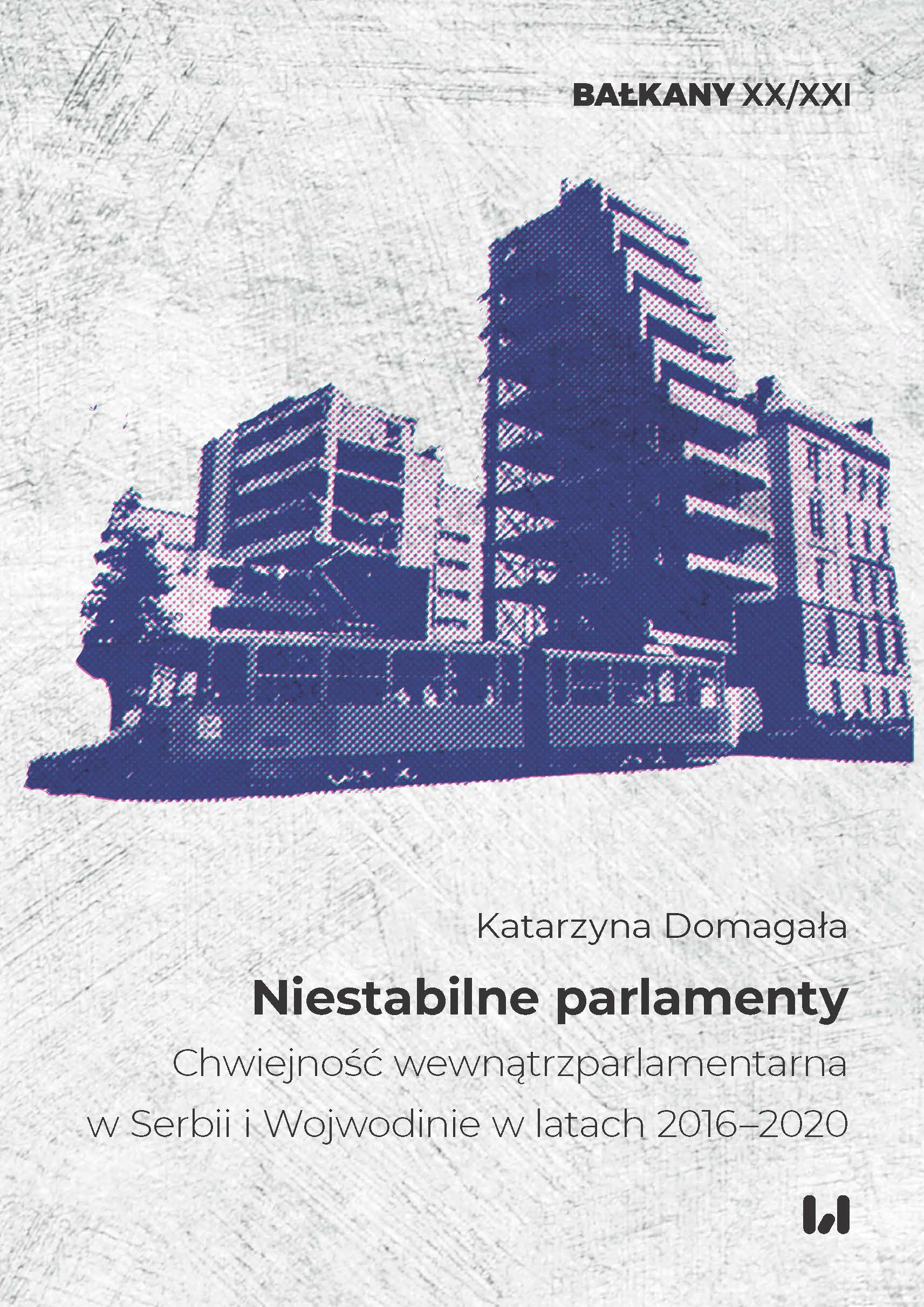
The main aim of the research was to analyze the genesis of the scale and the dynamics of the volatility in the exercise of the mandate of a deputy to the National Assembly of the Republic of Serbia and the Assembly of the Autonomous Province of Vojvodina. I chose national and regional parliaments for analysis to find out to what extent volatlity in the performance of deputies’ mandates interfere in Serbia on these two levels (in other words: how often regional deputies "cross" to the national parliament – and vice versa). Analyzing the intraparliamentary volatility on the personal level, I decided to examine both party-switching and replacement. I tried to refer the findings of the researchers - focused on the systems of consolidated democracy and parliaments at the national level - to the case of unconsolidated democracy and parliaments at various levels: central and regional. An additional goal of the study was to trace the dynamics in the evolution of the party systems in Serbia and Vojvodina, in order to show that in fact these systems remain fragmented and extremely polarized, which is important for the scale and dynamics of the volatility in the exercise of deputies’ mandates.
More...
W miarę upływu czasu i wzrostu świadomości skutków Brexitu zaczęły się pojawiać, i pojawiają się nadal, jego bardziej pogłębione analizy. Do takich zaliczyć należy monografię Zrozumieć Brexit. […] Autor zaprezentował bardzo dobrą orientację w temacie i umiejętność panowania nad swoim wywodem. Udowodnił, wbrew obiegowym opiniom, że Brexit nie był przypadkowym epizodem, czy też „wypadkiem przy pracy”, lecz logiczną konsekwencją nieufności, która cechowała relacje Wielkiej Brytanii z Europą kontynentalną po II wojnie światowej, i to zarówno na poziomie elit, jak i społeczeństwa. prof. dr hab. Andrzej Antoszewski Łukasz Danel przekonuje, że Brexit był nieuchronnym zwieńczeniem skomplikowanych relacji Zjednoczonego Królestwa z integrującą się Europą, i konsekwentnie prowadzi narrację tak, by udowodnić, że inny scenariusz nie był możliwy. Post factum trudno się z autorem nie zgodzić, zwłaszcza że na każdej stronie wyposaża nas w kolejne argumenty potwierdzające postawioną tezę. […]Książkę świetnie się czyta, gawędziarski styl sprawia, że nawet trudną materię i sporą dawkę faktów przyswaja się z łatwością. Utrzymanie uwagi czytelnika jest tym bardziej zaskakujące, że przecież każdy zna finał szorstkich relacji Zjednoczonego Królestwa ze Wspólnotami Europejskimi. Mimo to wiele fragmentów książki Danela poziomem emocji przypomina polityczny thriller. prof. dr hab. Anna Pacześniak
More...